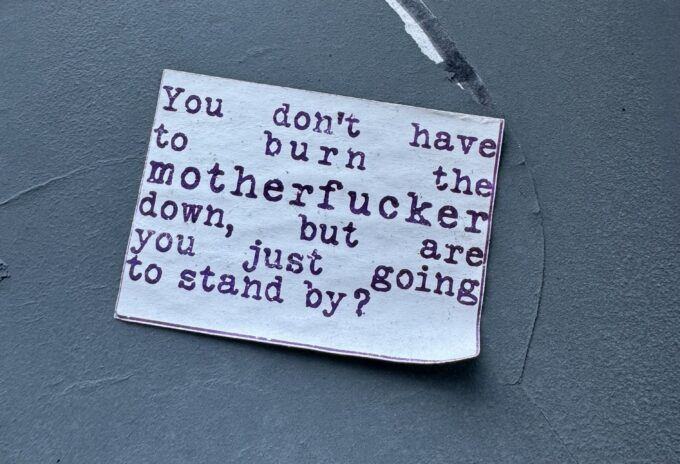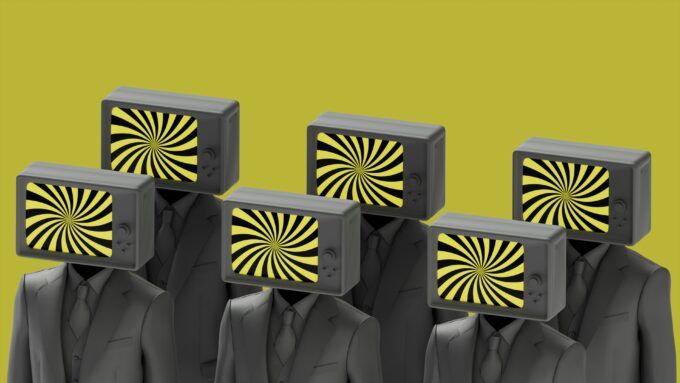Published on http://www.counterpunch.org/
My resolve is to think through the following dialogue of There’s This and Then There’s That.
There’s This: Apply Pascal’s Wager to global climate change: There may be no Hell waiting for sinners just as there may be no “climate chaos” waiting for us due to our burning fossil fuels. Pascal asked us to wager on the side of there being a Hell and so act to avoid it. If it turned out we were wrong, the price to be paid would be far less onerous than if we bet against the event. Seems smart to apply this logic to our “climate change/global warming” situation.
But the wager may not have to be taken up at all if you are over 50 now and it will not matter if the earth is unlivable in 2050. It is an ironic tragedy for sure that those who will be around to experience this future are not those presently with the power and influence to tend to the wager or not.
You might also wager against the existence of human caused climate change if you are now are reaping the profits of fossil fuel. You see no reason to give those up for some predicted event your present wealth may enable you to escape. You may also profit from such an event, as do the traders depicted in the movie The Big Short who made a fortune betting against packaged mortgaged securities. There’s That.
What to do with those who don’t make a fortune by selling short and so on but just get shorted, or as the Presidential Hopeful, Donald Trump puts it, “schlonged.”
There’s This: You need to assume personal responsibility for that choices, good or bad. You have no brief favoring a redistribution of wealth in your direction.
What if choice, chance and context are so entangled that it’s impossible to affirm that any consequence is purely the result of any one? Is it possible to project your own will into the universe and thus overpower all obstacles of chance, time and place? Or, does chance place some of us in a position to claim that power? Does a plutocracy justify and defend itself by affirming the deep wealth divide as a proper consequence of every person being equally free to choose and all choices surmounting all obstacles? There’s That.
There’s This: Michael Moore’s new film Where to Invade Next displays the preference of certain EU countries for “people over profits” and thus puts into relief our own preference for the reverse. Sophia McClennan’s review of the film in Salon: “From debt-free education to paid leave, women’s rights, prison reform and delicious school lunches, Moore offers viewers a world where people simply live better than we do here.”
In Europe, taxes, government, and the word “socialism” do not rouse citizens to vitriolic protest as they do in the U.S. where the government is seen as taxing the deserving and handing it out to the undeserving, working hard to take away your guns, allowing illegal aliens to take your job, and supporting abortion clinics. The U.S. is thus not about to copy Denmark’s 60% taxation for income over 60K. There’s That.
There’s This: In 2011, Pew found that Millennials were “36 points more favorable toward socialism, which they actually preferred to capitalism, 49 per cent to 46 per cent.” (Peter Beinart, “Why America is Moving Left,” The Atlantic, January 2016). In regard to taxes, The New York Times reported (Dec.30, 2015) that “when Bill Clinton was elected president, the 400 highest-earning taxpayers . . .paid 27 percent of their income in federal taxes . . .” and that by 2012 “that figure had fallen to less than 17 percent… slightly more than that for the typical family making $100,000 annually.”
The New York Times also reported “Americans’ desire to soak the rich has diminished even as the rich have more wealth available that could, theoretically, be soaked.” (April 17, 2015) There’s That.
There’s This. Is there more harm done to a society by someone gaming the system or by campaigning to cut off as many people as possible from government assistance, ostensibly for their own good?
Since 1979, most American workers have seen their hourly wages stagnate or decline; profits have gone to investors and not to workers; globalization and worker replacement AI and robotics have stagnated the middle class, the class upon which a prior equity of wealth and socio-economic mobility were based. That beleaguered majority of Americans, now supporting Trump, are in no mood to extend any welfare largesse to those who are non-citizens, foreign-born, and — looming large in the imagination — illegal aliens. There’s That.
There’s This: We are more inclined in the direction of Emersonian “Self-Reliance” and Maimonides’ give or teach a fish story than we are to a sense of interrelationship and interdependence that inspires all socialist views. Our difficulty, however, is in our zero sum economic view in which we accept the Loser as necessary if the Winner is to win. In other words, we leave those who have little or nothing, an increasing number in our plutocracy, to rely on that little or nothing, and require all to adopt the values and meanings of those who have much and have much more as wealth compounds.
There’s This: Education in the U.S. is presently more confusing than the Syrian battle zones. The foundational strength of American egalitarian democracy depends upon free, public education available to all citizens thus fostering a common cultural literacy from which a common and not elitist or aristocratic view of politics can develop.
Market principles should be applied to education so that profit making will incentivize the development of effective learning strategies. There’s That.
There’s This: Nurture the minds of capitalist success with STEM courses.
Nurture the critical mind that may possibly constrain capitalism within other value systems, as for instance Bernie Sanders observes in Denmark and Michael Moore observes all over Europe. There’s That.
There’s This: Socio-economic status has nothing to do with learning, that such a context does not affect either teaching or learning.
“Conditions on the ground,” that is, what environment a child is born into and bears within upon entering school, has all to do with how teaching and learning are to proceed. There’s That.
There’s This: You can teach any way you want and enforce all sorts of rules, teaching being as pliable to profit as to non-profit.
Learning is mystical and magical. But it seems to depend more upon properly accessing where the learner is positioned, socio-economically and thus experientially than upon school uniforms, new technology or IQ tests. And to do that accessing, this country first has to acknowledge the medieval feudal state in which it has now placed its population. There’s That.
Lastly, I resolve this New Year to think through technology, which seems in a way to be the ubiquitous answer to all our problems, or the source of all our problems.
There’s This: If we put aside the whole matter of redistribution of money and services and concentrate on cheerleading the Winners, as all the Republican presidential candidates advise, there may eventually be so much wealth that it can’t help but trickle down to Everyman’s pocket. And technology primes the pump of economic advance.
Some 80% of the population may be working twice the hours for the same buying power as their parents but the seductions and distractions of hi-tech, a kind of bread & circuses that the endless innovations of the market provide, prevent them from protesting the world the plutocrats have made for them. There’s That.
There’s This: Our wealth gap statistics flash a “Danger, Will Robinson!” but our quality of life reaction seems to increase with every new cybertech innovation. And we have that increase despite the fact that our extension of a helping hand to others is the slightest among all industrialized nations. You wonder than whether any degree of misfortune is not being diminished by the presence of hi-tech? You may be totally disenfranchised in every way possible but you can post on Facebook, you can text to fill in the dark moments, you can surf the web under your own direction. You can empower a cyberworld that in turn empowers you. Even the Syrian refugees are being guided by their GPS and kept updated through their Smartphones. They are the first diaspora documenting their plight with selfies.
Suicides among white middle age males have increased 40% in the last ten years. Anti-depressants in the U.S. have experienced a 400% rise since 1988. Rates of depression among Millennials have been soaring although Millennials are more closely tied to cybertech than others are. A University of Michigan study of college students reports a 40% decline in empathy, the decline most severe after 2000 as cybertech connectivity increases. So it seems hi-tech may not after all be bolstering one’s quality of life response. You can be on the bottom 40% of the wealth scale, have a Smartphone and an X-Box and still feel depressed/suicidal. You can be on social media all day while your empathetic connection with others diminishes. There’s That.
There’s This: AI and robotics promises to end work and release us into leisure.
Your leisure life is automated, your working life is gone, the owners of the robots will have leisure and money, and someone will have to keep you occupied and out of mischief. Virtual reality, a comfy sofa and a six pack may be the leisure of the future for those “liberated from work.” There’s That.
There’s This: Cyber, AI, cell phone, and robotics tech may compel a quantum leap in learning. We may be rapidly departing from the Gutenberg Galaxy, the world of the book, and entering what Marshall McLuhan saw as liberation from the visual and an emancipation of all the senses in interplay an analog perception cannot appreciate.
But what if the attractions and seductions of our personally designed relationship with our Smartphones preempt the hierarchy implicit in teaching and learning itself? What if no outside authority or gatekeeper exists that attracts your attentiveness equal to what your own preferences and opinions, inevitably caught in a vicious circle of redundancy, produce?
Dominic Pettman in his new book, Infinite Distraction, connects dispersal into personal ways of knowing with a collapse of the kind of Thomas Paine “common sense” and political solidarity that allows “politics” to happen and social change to result.
“[W]hat if the problem is not that we are all synchronized to the same motions or moments, but rather dispersed into countless different emotional micro-experiences? What if the effect of so-called social media is to calibrate the interactive spectacle so that we never fully feel the same way as other potential allies at the same time? While one person is fuming about economic injustice or climate change denial, another is giggling at a cute cat video. And, two hours late, vice versa. The nebulous indignation which constitutes the very fuel of true social change can be redirected safely around the network, avoiding any dangerous surges of radical activity. There’s That.
There’s This: Elon Musk’s SpaceX Rocket landing is “a giant leap toward a city on Mars,” mainly because Musk is able to refuel his rocket. So, technology may take Pascal’s Wager regarding climate change off the table. We can choose not to be on the planet Earth by the time “climate chaos” occurs, thus we can end all our pitiable global warming mitigating efforts and continue increasing the release of greenhouse gases. It won’t matter because the Earth’s atmosphere and climate will no longer be ours. Mars will be our new marketing frontier.
Hi-Tech may also lead to safe, healthy forms of alternative energy. . .which may expand to a scale that fossil fuel presently provides . . . and which may also re-position the stock portfolios of the wealthy so that they reap the same return without interruption… and accomplish all before “climate chaos,” already showing its face, reaches a “Planet Uninhabitable by Humans” stage. There’s That.















